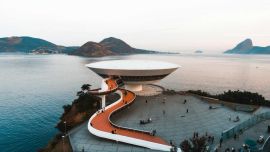Latin America’s most important political analyst Jaime Duran Barba declares that the new successful form of politics revolves around humour and participation.
“You’ve got to be David and not Goliath,” declares the Ecuadorean, while forecasting that Argentina’s only escape route from a hecatomb is for the opposition and the government to resort to dialogue and agree on basic medium-term goals to ensure development.
What does this new wave of presidential outsiders mean for Latin America: [Pedro] Castillo in Peru, following on from [Jair] Bolsonaro in Brazil, and [Gabriel] Boric in Chile – presidents who did not even have a political party to elect them a year previously? Is that something which could be replicated in Argentina?
It’s a worldwide phenomenon which was already accelerating before the pandemic. This is an effect of the third industrial revolution connecting people between themselves, bypassing the institutions and the authorities. It had already made itself manifest with the presidency of [Donald] Trump in the United States, who was an outsider.
But still within the Republican Party and hence the political system.
Within as a vote-catching machine but outside as a Republican. The Republicans properly speaking repeatedly asked him to resign his candidacy, worse still after the sex scandal. They formed the Lincoln Project with many professors of my faculty, which is a lovely communication project you can consult in YouTube of anti-Trump Republicans. In other words, Trump was against both the Republican and Democratic Parties.
Trump used the Republican Party but Boric, Castillo and even Bolsonaro did not even use a political party, they created their own.
This was more serious in the case of Boric. He was squeezed out of the front which governed Chile for so long, the Alliance, because they said he was useless. So he was kicked out and finished second behind [José Antonio] Kast running for the right, who also threw him out as useless. Third place went to a candidate ignored by everybody, Franco Parisi, who campaigned from Alabama via the Internet. The two major Chilean parties which had governed the country since the fall of [Augusto] Pinochet until now, the Alianza and the right, finished fourth and fifth. It was a hecatomb.
[Mauricio] Macri constructed a party but it took him several years – he had to be mayor of the third most important district in the country in terms of votes before he could aspire to the presidency and with the help of the Radical party, with its enormous history in Argentina, whereas Bolsonaro, Castillo and Boric constructed organisations permitting them to reach the presidency overnight.
Bolsonaro was impressive because even though he had been a deputy for many years, he sat for a one-man party – he was totally irrelevant. When Dilma Rousseff was impeached, his speech was ridiculously unprepared.
I’ve had the opportunity for different reasons to be with him a few times. He’s a person with scant communicational skills, he doesn’t know how to talk, which explains what happened in Brazil. Every candidate aspires to be invited to that round of debates at the climax of the Brazilian presidential campaign beginning in Bandeirantes and ending in O Globo. When I worked with Marina Silva in 2010, her aspiration was to reach 10 percent in the opinion polls so that she would be considered for the debates, the great aspiration of any Brazilian politician. Bolsonaro did not go to any debate. At first I said to myself: “What a nutcase!” Then I understood, he’s very bad at debating and would stand exposed.
Bolsonaro’s campaign closure is one I always use in my courses. He convened a rally in the Avenida Paulista, an important thoroughfare of São Paulo. Around 300,000 people showed up but instead of going where that scenario had been set up, he said: “No, I’m going to speak from my house.” The speech of Bolsonaro, dressed in a jogging suit, pronounced from his house in front of some clothing pegged to a washing line and filmed by a friend with his mobile telephone to retransmit to the multitude, lasted barely five minutes. “Brazilians, how good that you have come!”, “Bolsonaro, Bolsonaro, president of Brazil!”, “Thank you, Brazilians” and that was the speech.
Can you imagine a traditional candidate like Fernando Henrique Cardoso with a speech like that? They’d send him to the loony bin.
In the last couple of decades the speed with which an outsider could reach the presidency, Macri being one of those examples, was 10 times less than now. Today’s outsiders could go down a road in a year which would take a decade before. What has changed is the speed of change.
And communication has changed, now it is not necessary to speak. This is a theory which has been developed in politics since 1960 by Joe Napolitan, the founder of my profession, who said: “People see politics, they do not hear it, it doesn’t matter what the candidate says, it matters what he communicates, his body language, his entourage, his clothing, his image.” And Bolsonaro had that image of an ordinary Brazilian who is very worried about crime. The great offer of his campaign was: “I’ll decorate every policeman who kills a criminal.”
The case of Castillo is the same. Curiously enough, Zoom, whose existence was unknown to me until the pandemic began, turned into my daily work tool and via that instrument I’ve become more involved in electoral campaigns than ever before in my life. In Peru, my partner [Santiago] Nieto did three opinion polls for candidates of Acción Popular and Apra and what we saw from those polls is that the only things unifying most Peruvians was a hatred of politicians, a brutal hatred of Congress, a total mistrust in the judicial system and a wish for somebody to turn up who did not resemble politicians in the least.
And then Castillo came along with that hat...
In a context with a highly prepared candidate who had published 10 books, a great literary figure, a great orator, and from our study the conclusion was: “Don’t even bother, it’s not the time for people like you. Somebody has to come along totally different from what you are.”
If it took Macri 10 years while today Boric or Castillo do it in one, would it be possible in Argentina for somebody like [Javier] Milei to reach the runoff next year?
It’s perfectly possible for Milei to reach the run-off next year. And let us not forget that even though Macri took a long time, the things which most helped him to advance were the things which irked the establishment – jumping over potholes 20 years ago and his balloons which were ridiculous but communicated with the people. A series of things of that style were what made him able to communicate with people.
Boric is similar, when a multitude gathered and he could speak, he climbed onto the branch of a tree to speak from there, no formality about him. His stances were so exotic that the left rejected him. Boric always said that Caribbean military dictatorships disgusted him. He always rejected [Nicolás] Maduro, he always rejected [Daniel] Ortega, which are sins in the leftist religion. He’s not a normal kind of guy.
In an interview in this same series, the Argentine ambassador in Brazil tells that ex-president Lula has asked for videos of Milei, because he wants to understand the phenomenon. You have been out of Argentina two years now and thus will only have seen Milei via the media. Now that you’re returning to your lectures at the University of Washington, is Milei a case study?
Without doubt he’s a case study, I follow him closely, as I follow Argentine politics all the time. I feel sentimentally very bound to this country and this city and keep an eye out all the time.
When you look at Milei and see his exponential growth in the opinion polls, what forecast would you make regarding him?
He has plenty of drive. He gives me the impression that in the last few weeks he has been falling into the mortal illness of politicians, which is ‘egolatry’ – he already feels himself to be president. Those who believe that normally end up at home and that could happen to Milei.
I heard you say that if Juntos por el Cambio does not rejuvenate, it risks not winning an election which is theirs to lose, either in a run-off against an outsider like Milei or even a possible recovery of the government and the re-election of the current president or some other [Frente de Todos] candidate.
Juntos por el Cambio needs to regain its youth in an epoch in which the old values have lost prestige. Currently the relationship which you and I had with our parents no longer exists – not between children and parents nor between congregations and priests nor between students and teachers. Everything has changed. PRO knew how to become an alternative for a series of reasons and therein lay its strength. When it was the PRO of Macri leaping over potholes, about which people still talk, the PRO of the balloons and the PRO with no offices until 2003, it was an alternative. Now it has an office very much in the Google style – floors with rows of computers where nobody has an office or any rank. All the senators and deputies feel bad because they are elbow to elbow with messenger boys. All those instructions helped to make PRO different. When you have been in government for so many years, you inevitably become bureaucratic.
Do you grow old?
Bureaucracy is the enemy of life and things get complicated when they are bureaucratised.
Could Frente de Todos freshen up?
To be more attractive, to draw attention, to trigger conversation.
Ideologies like Frente de Todos are based on the values of party with such deep roots as Peronism. Could a fresh face be compatible with a party like Peronism which necessarily has a conservative component due to its enormous heritage of ideas?
I don’t honestly think it has ideas, they have weird posturing, nothing more reactionary than Cristina Fernández [de Kirchner], who never defended anybody from political persecution or a missing person and calls herself a leftist.
Do you see Kirchnerism as Peronism or do you consider Kirchnerism to be a Falangist Peronism?
It is a post-modern expression of Peronism. I know some very interesting Peronists.
Is Kirchnerism an evolution of Peronism?
Yes, a weird byproduct.
But is it a byproduct representing a faction of Peronism or the continuity of the whole movement?
It’s an exotic faction. I’ve been a leftist, the left is very interesting, I like it but Alberto, Cristina and the rest are people who turned to the left in their old age. So they have this crazy pox, they don’t know what the left is so they get confused and believe that [Vladimir] Putin is the leader of the proletariat.
With over a year to go until the October elections of 2023, is the scenario you finally imagine a run-off between the two coalitions or between one of them and Milei, without having decided which of the three make it to the run-off?
I insist that it is completely unpredictable and I tell you that because what happened in other countries was completely unpredictable and I went in there head first, researching and personally interviewing the candidates either directly or via Zoom, as well as their campaign teams.
When [Joaquín] Lavín lost the candidacy for the right (in Chile), I interviewed [Sebastián] Sichel, who ended up as the candidate for the right and his victorious team with the opinion polls declaring them frontrunners and [then-president Sebastián] Piñera to be doing marvellously. You have to see all the variables in the opinion polls and the research. The opinion polls do not serve to guess the future – you use them to know what is going on. And what was going on was that the Chileans were fed up with the old politicians, all of them, so it doesn’t matter if you top the opinion polls, you’re going to lose.
How are the Argentines?
Fed up with everything, not just politics, everything, some because they feel themselves to be victims of a political system which exploits them.
That’s where Milei’s discourse of “a caste” is so penetrating ..
The “caste” discourse and fatigue. There are so many people in Argentina who say: “Why do I have to pay the pickets to party?” That makes many people indignant, it’s impressive.
I was in Ezeiza [Airport] a few days ago and the number of young people leaving makes me very sad. Two youngsters who graduated in the United States and whom I got to know and their families, leaving for good to Spain because there is no room for them in Argentina. That sector of society and the other sector which has lived off this crazy system of subsidies are reaching crisis point because there is not sufficient money to maintain them.
What a picket now receives represents half of what he was collecting a year ago. He wants quite legitimately for it to be doubled and there is no way it can be doubled so things are at bursting-point at both ends. The Argentine left is too antediluvian, they’re old people. They sing the same songs and say the same things as I did when I was 15 but they are no longer 15 and both the Soviet Union and the Cold War are past history. They are very committed people ethically, their deputies share their salaries. They do what they can but they are like Templar knights without a horse, they’ve lost all touch with reality. So there is no alternative either from the left, properly speaking.
Production: Sol Bacigalupo and Natalia Gelfman.


























Comments